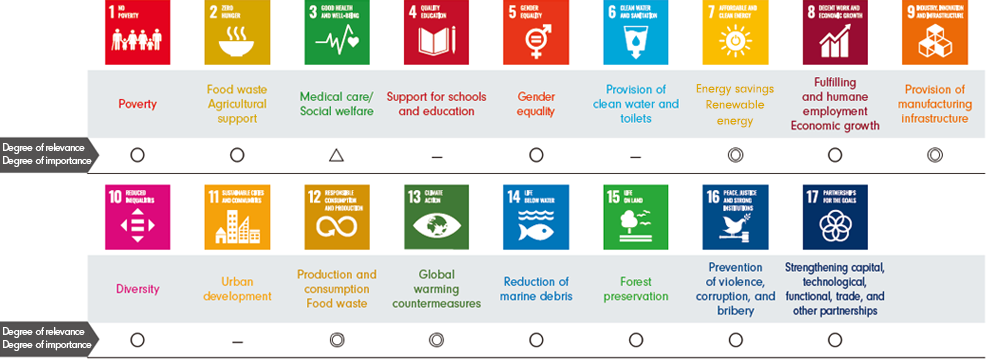Materiality (Important Issues)
Materiality Designation Process
Addressing the UN’s Sustainable Development Goals (SDGs) and other issues surrounding sustainability is essential to achieving the Sodick Group’s sustainable growth and vision, and we recognize this as an important management issue. We have designated our materiality to accelerate the sustainability activities we have been carrying out to date, as we strive to enhance corporate value over the medium to long term.
In the materiality analysis, we analyzed the relevance and importance of global social issues and the 17 SDGs to our company from both positive and negative aspects. From that analysis, we then identified social issues in light of our corporate philosophy, and summarized them as four materiality issues (important issues).
Analysis of 17 SDGs in terms of their relevance and importance to Sodick

Designation of important issues in light of our philosophy

Materiality issues (important issues) and main KPIs
We cannot simply designate materiality; it also needs to be integrated with our business strategy as “important issues related to the sustainability of our business model.” We are carrying out ESG activities as part of our measures to strengthen our management base under the medium-term management plan, and we have set materiality KPIs for these activities.
Four materiality issues (important issues) and main KPIs
※You can see the entire Directors and Audit & Supervisori Board Membersable by scrolling horizontally.
| KPIs | ||
|---|---|---|
| Targets | ||
Contributing to evolving manufacturing
Anticipated outcomes
Contribute to the foundation for economic development through the advancement of sophisticated manufacturing
|
Setting targets for environmentally friendly products | |
| Percentage of environmentally friendly products in total machine tool sales: 75% by 2026 | ||
| Percentage of environmentally friendly products in total injection molding machine sales: 100% by 2026 * Incorporates P. SAVE MODE |
||
Addressing environmental management
Anticipated outcomes
Use renewable energy and reduce CO2 emissions to achieve carbon neutrality
|
Reducing greenhouse gas emissions | |
| Greenhouse gas emissions (Scope 1 and 2) ①46% reduction by 2030 (vs. that of 2017) ②Carbon neutrality by 2050 (including Scope 3) |
||
| Improving energy consumption rate index | ||
| Energy consumption rate index: At least 3% improvement over three years (2024–2026) | ||
Promoting diversification of human resources
Anticipated outcomes
Further promote a corporate culture in which diverse employees can work comfortably with a sense of satisfaction
|
Increasing percentage of women in management positions | |
| 5% by 2026 | ||
| Increasing percentage of male employees taking parental leave | ||
| 100% by 2027 | ||
Strengthening governance
Anticipated outcomes
Strengthen both offensive and defensive governance to support management as the Company grows
|
No numerical targets set. Aim to resolve issues from perspectives including evaluation of the Board of Directors’ effectiveness, internal controls, risk management, and compliance. |
|
